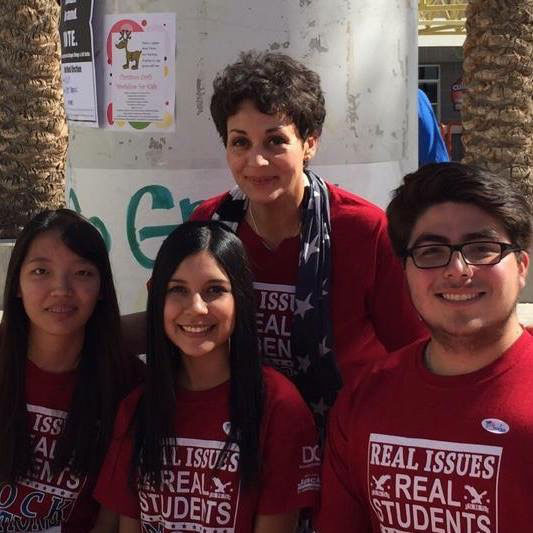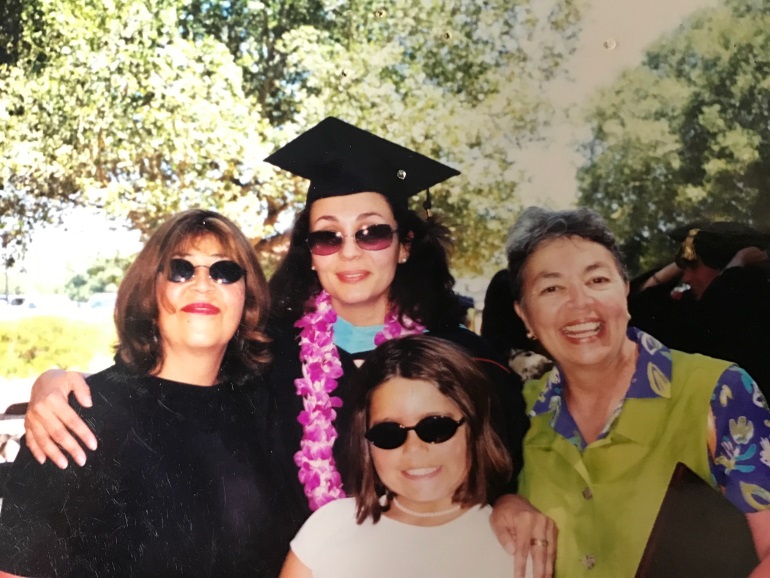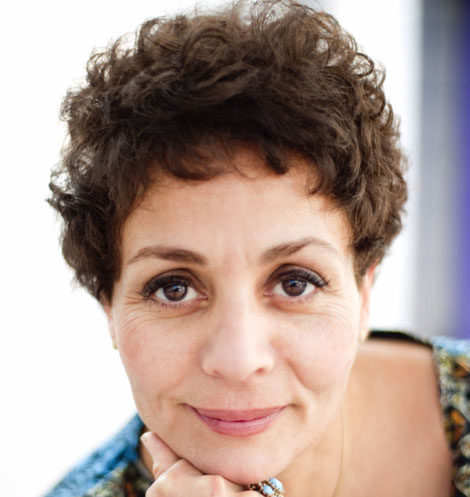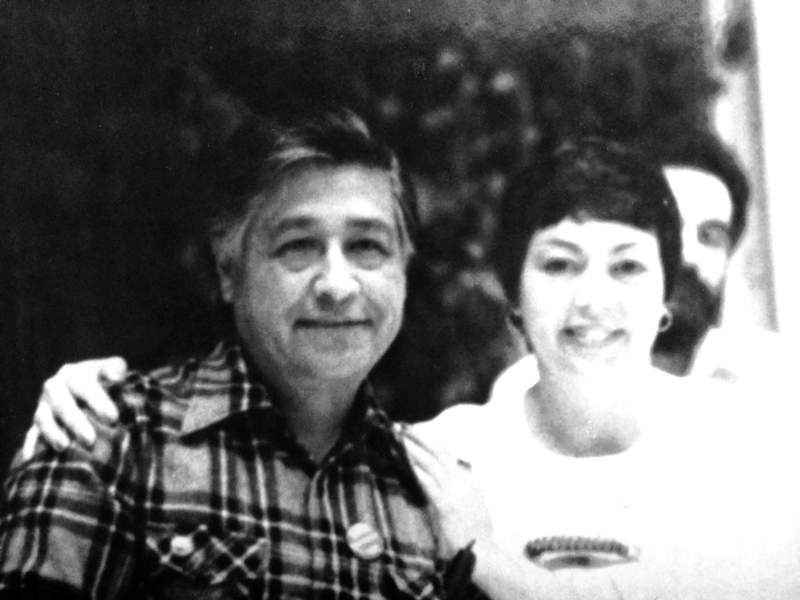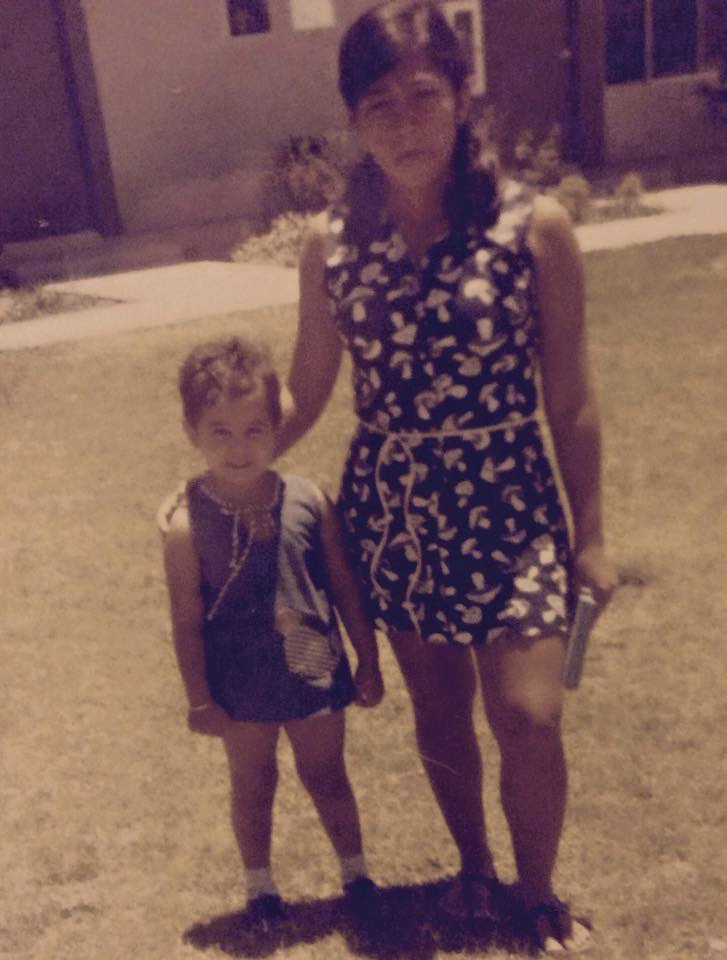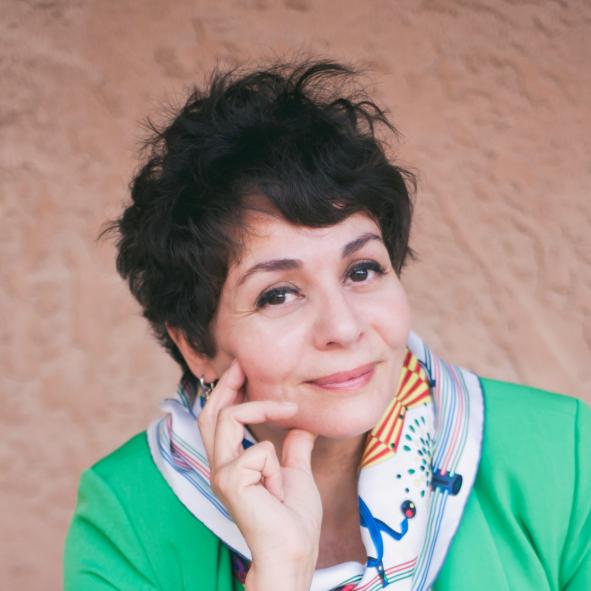
Haydee Rodriguez, MA ’02
Haydee Rodriguez is recognized for her commitment to her students, high standards and creating powerful learning experiences.
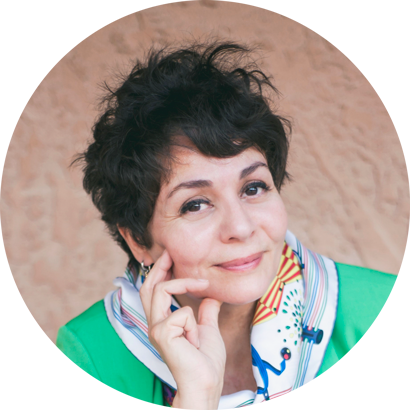
A role model of their own: Alumna dubbed 'adolescent ambassador' challenges and inspires students in her hometown
Haydee Rodriguez is recognized for her commitment to her students, high standards and creating powerful learning experiences.
By Joyce Gemperlein
Haydee Rodriguez, MA ’02, suffered massive internal injuries and brain trauma in 2011 when a car in which she was a passenger collided with a fully loaded big rig. Near death, she was in a coma for about a month.
But three months later, she was surprisingly already back in her classroom in her hometown, the agricultural and marginalized city of El Centro, Calif.
Rodriguez said she returned to school so quickly after the accident when her mother told her, “Teaching is your purpose, and your work with your students brings you so much joy, you’ll die if you stay home.”
Rodriguez – her first name is pronounced EYE-DAY -- concedes that she was still suffering from pain and post-traumatic stress when she returned to Southwest High School. Still, it was important that she be back in the classroom.
Rodriguez’ journey continues on Oct. 20, when she is honored with a Stanford Graduate School of Education (GSE) 2016 Alumni Excellence in Education Award. It recognizes GSE graduates who are transforming education, changing communities and influencing policy.
She will receive the award during reunion week along with Joseph Castro, PhD ’98, president of California State University Fresno; and Piya Sorcar, MA’06, PhD ’09, founder of the nonprofit TeachAIDS.
Rodriguez’s mother and role model, Gloria Vasquez, will be at her side. In spirit at the ceremony will be the nearly 5,000 students, community members, colleagues nationwide and parents who telephoned the hospital after her accident.
They were worried about their teacher and friend, dubbed the area’s “adolescent ambassador” for her advocacy and deep involvement in the struggles of middle- and high-school students.
Despite the passage of time since her own childhood, Rodriguez, 50, realized the students were growing up as she had -- poor, geographically isolated and experiencing daily aggressions signaling that they are not good enough because they are of Mexican descent.
Rodriguez, a high school dropout at age 16, helps her students confront those obstacles in the Central Union High School District of El Centro where, at various times, she has taught economics, government, journalism, United States and World History, Spanish Literature and Language, English Language Development, Social Studies, theater and other subjects.
She also has coached debate teams and research projects that have taken her students to compete and win on a national level, and has incorporated community service into their lives.
In the 13 years since she returned home, Rodriguez has “embodied the transformative spirit and commitment to education that Stanford represents,” wrote J. Todd Finnell, Imperial County Superintendent of Schools, in a letter of support for Rodriguez’ nomination for the alumni award.
“Although she has at times met with resistance by colleagues and administration, she . . . has taken a powerful stance against the Pedagogy of Poverty and has created curriculum and learning experiences for her students that are often reserved for more privileged students,” wrote Maria Hyler, who nominated Rodriguez and is senior researcher at the Learning Policy Institute.
Rodriguez graduated from Stanford Teacher Education Program (STEP) with three single-subject credentials in Social Studies, English and Spanish. She then participated with a group of Stanford GSE graduates in the 2001 founding of East Palo Alto High School, now called East Palo Alto Academy, a small public charter school for underserved students.
Rodriguez calls her two years there “a powerful experience” because of her colleagues’ commitment to students and willingness to solve problems collectively. But she yearned to take her skills home and moved to Holtville Middle School, which is near El Centro, to teach history for two years.
She then shifted to teaching in the Central Union High School District, where her persona, teaching methods and dedication to education quickly became known outside her classrooms.
“What is perhaps most notable about Haydee is that she sees the strengths and gifts in every single student she teaches. She calls to and cultivates those gifts. She does not waver in the high standards she sets for her students. Instead, when they pull back or do less than their best, she leans in, redoubling her efforts to reach and teach. She expects no less of every teacher we license in California,” wrote Mary Vixie Sandy, executive director of the California Commission on Teacher Credentialing (CCTC).
A thirst for learning
California Gov. Jerry Brown appointed Rodriguez to the CCTC as a teacher representative in 2014. She served during a period of significant change in the state’s policies regarding licensure and quality in teacher education. She also has been a National Board Certified Teacher and a member of the Board of Directors for the National Board for Professional Teaching Standards since 2009.
In 2015, she received the Las Primeras Award honoring extraordinary Latina leaders from MANA, the National Latina Organization. Among numerous other awards, Rodriguez in 2012 was given the Teaching Excellence and Achievement Award and represented the U.S. Department of State as an educational ambassador in Brazil. In 2007, she was named Teacher of the Year by the Association for School Administrators, and the year before was a team member of Rotary International’s Study Exchange group in West Africa. As coach, she’s taken the Academic Decathalon and Mock Trial teams to victory at the county level and on to state competitions.
Rodriguez was on the board of Orphanaid Africa and Literacy Volunteers of America. She developed “Reality Check,” a curriculum for teens who have dropped out of high school to help them understand cause and effect; and “Aesop Revisited,” a curriculum to teach adults English and its cultural nuances and idiomatic expressions. She co-wrote a parent education curriculum on the importance of being a positive role model.
“She has a real thirst for learning, works tirelessly and has an unbelievable spirit for life,” said Rachel Lotan, who was director of STEP from 1999 to 2006 and was Rodriguez’ academic advisor. Lotan is also co-creator, with Elizabeth Cohen, of the project-based and complex instruction concepts that Rodriguez introduced to the Imperial Valley.
“I do not know where she gets the energy,” Lotan added, noting that two summers after her accident Rodriguez fulfilled a promise to her mother to walk The Way of St. James in Spain. She walked from the French Pyrenees to Santiago de Compostela in Spain, a trip of 560 miles, in 41 days.
Rodriguez said her teenage self would be flabbergasted by her career in education.
Educator role model
She said she was a rebellious adolescent who dropped out of high school after a history teacher viciously denigrated Cesar Chavez, the Mexican-American labor leader and co-founder of the National Farm Workers Association (NFWU) in 1962.
“Like most teens, I had regularly questioned inconsistencies in adult behavior, in a traditional school, especially a Catholic school, this doesn’t go over well. Calling Cesar Chavez, a man I knew, a profiteering womanizer man who pimped poor people was the last straw,” said Rodriguez, who just days before the incident had attended a conference with her mother where Chavez had been honored by Pope John Paul II.
Rodriguez was reared by her maternal grandmother and Vasquez, who was educated in Mexico. Vasquez supported Rodriguez, two sons, her own mother, and two sisters in Calexico, Calif., by working as a bookkeeper and buying, refurbishing and re-selling old Volkswagens with a friend who was a mechanic.
Vasquez went on to work in migrant education. By the time she retired in 2001, she had a master’s degree and had been Imperial County’s director of migrant education for 15 years. She is known nationally for her achievements in migrant education and was instrumental in working with other leaders to introduce Chavez into the educational circles.
“It is hard not to be conscientious when you have a mother like that,” Rodriguez said.
Vasquez, who is now 76, was not pleased when her daughter dropped out of school, but stood by her and eventually urged her to get her GED. Rodriguez went on to study theater at a community college, took a break and joined corporate America, and then transferred to San Diego State University to graduate with distinction in 1998 with a bachelor’s degree in social sciences/history.
She wanted to go to law school, but was encouraged by her mother to teach in a local adult education program. She immediately fell in love with teaching and, eventually, her heart told her to take her skills to her hometown.
“I do not see myself as here to save people,” Rodriguez said recently. “I hope I do not come across that way. I want to be in the community where I grew up, to support students who may be poor or do not have the same opportunities other students do and whose parents may have language barriers.”
She continued, “We are socially, geographically and economically disenfranchised down here in the Imperial Valley. Often our students only see what is around them and that dire image becomes entrenched in their psyche of what is possible. I want to offer an alternative vision, expose them to opportunities that will change their worldview and make them want more for themselves, our people and our community.”
Rodriguez said she knows all too well how “it is important for me to be a role model for young Latina girls who are just like I was. I say ‘I did this and I had similar challenges to you, but this is what we do and this is how we get from here to there.’ “
She said she received a first-rate education at Stanford.
“When I feel disillusioned, a source of strength for me is the knowledge that I received a solid foundation in pedagogical content knowledge and adolescent development from the experts in the field -- the people who developed the theories and wrote the book on the matter. I am part of a strong network because of the relationships that I’ve developed as a result of being a Stanford alum and I always have someone or somewhere to turn to access the latest research or a sounding board. I’m also fortunate because my favorite Stanford Alum, pedagogue and compass in many ways is my greatest sounding board and that is my aunt Maria Balderrama,” she said.
“I am very fortunate because I work with many wonderful teachers in El Centro who share my goals,” she added. “There is always work to be done, gaps to be closed.”
Joyce Gemperlein, a freelance writer in the Bay Area and a former Knight Fellow at Stanford, is a contributor to the Educator, the online newsletter of Stanford Graduate School of Education. Please read our previous issues and subscribe.
All photos are courtesy of Haydee Rodriguez.
For more information about the GSE Alumni Excellence in Education Award reception, and to register for this special event, please visit the GSE’s Reunion Webpage.
